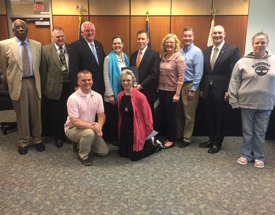This partnership ensures compliance with parole and supervised release requirements and makes meaningful connections to housing, training, and employment that can help reduce the likelihood of reoffense.
Lancaster Re-Entry Management Organization (RMO)
The Lancaster RMO was founded in 2005 to provide coordinated direct services to individuals returning to Lancaster County communities from incarceration in local, state, and federal prisons. A coalition of more than 50 nonprofit organizations, faith-based groups, and local and state government agencies, the RMO was created to break through silos of disconnected services for returning citizens and to address their complex needs and the barriers they face.

Lancaster County organizations working in partnership with the Lancaster Re-Entry Management Organization celebrated National Reentry Week April 24–30, 2016.
The RMO, which has its offices located in the probation and parole offices in Lancaster, recognizes that many "returning citizens" — as the organization refers to its clients — experience a multitude of challenges, including a lack of adequate housing, substance abuse and mental health issues, unemployment, and financial stress. The RMO also advocates for systems and policy changes as these individuals will also likely encounter policy and legal barriers to housing and employment based on their past offenses.1 To address these complex needs, the RMO provides reentry classes inside Lancaster County Prison, a returning citizens mentoring support group, a "compassion fund" that provides financial support for short-term needs, an intensive reentry program, and access to partner agency services and programs.
As an example of the coalition's work, from 2014–2015, the RMO served 34 clients in its intensive reentry program2 at an average cost of $2,907 per client, compared with an average cost of $7,390 to incarcerate individuals during that same period. In addition, in that same period, the RMO was successful in keeping 85 percent of those clients crime-free and 62 percent incarceration-free.3
Employment Training and Search Support for Returning Citizens
One of the RMO's core activities is to provide job search and employment services coordinated through the reentry services and employment program of the PA CareerLink of Lancaster County.4 The program includes a series of evaluations and occupational skills training exercises that lead clients with a criminal background to employment. Critical to the process is a reentry employment specialist who takes a one-on-one approach with each individual to identify aptitudes and skills and employer partners.
The RMO helps develop relationships that support each individual's job placement and that encourage employers to become a second chance employer. The RMO's executive director, Melanie Snyder, recalls approaches used to engage employers early in the program's development.
"The workforce investment board [WIB] director examined the projections of the number of baby boomers who would be retiring and said that employers cannot afford to overlook people with criminal backgrounds," she said. "He asked employers if they would hire people with a criminal background and their initial answer was no."
Snyder said the WIB director then asked what skills were missing in the local workforce, and whether employers would be willing to hire ex-offenders if the WIB created short-term certifications in the skills that employers said were needed and if ex-offenders obtained those certifications.
"To that question, employers said yes," said Snyder.
Snyder notes that clients must make a significant time commitment to successfully complete the PA CareerLink reentry employment program, although they can go through the program at their own pace. Clients must first participate in workshops on finding work, resume writing, applying and interviewing for positions, and career planning, and must provide supporting documents such as a driver's license or state identification, birth certificate, and Social Security card. Clients then complete a PA CareerLink program called Ready2Work and obtain a career-readiness certificate that confirms mastery of foundational and job readiness skills. After completing Ready2Work, clients have the option of enrolling in occupational skills trainings to give them the hard skills local employers need. A reentry specialist then helps identify suitable job opportunities. Some employers attend the final day of occupational skills trainings and interview prospective workers at the end of classes.
The PA CareerLink reentry employment program placed 192 people from all of the RMO programs into jobs with an average wage of $11.18 an hour, according to the RMO's 2014–2015 annual report.5 The program has had a large amount of success in placing job seekers in the manufacturing industry in roles related to forklift driving, manufacturing, logistics, and warehouse management, as well as in the construction industry. Snyder notes that different regions will have different key industries that offer opportunities for returning citizens, but that the crux of the work comes down to developing relationships with employers willing to take a chance on returning citizens.
Creating New Partnerships to Address Unmet Needs
Although the RMO has created a notable collaborative approach to reentry, there are opportunities for additional partnerships to help address unmet needs of returning citizens. RMO clients often need access to basic financial services and small consumer loans to help with security deposits or work-related expenses. Snyder cites the importance of banking partners to the coalition's work and says that the RMO "refers clients to BankOn Lancaster6 to address pressing financial literacy and banking access needs." She notes that there are opportunities for financial institutions to build partnerships with the RMO and other reentry coalitions.
Expanding the Breadth of Reentry Coalitions
Coalition building is challenging. Each agency has different goals and priorities and there are conflicting program requirements and funding needs. There is a need to develop trust among partners and to ensure that decision makers are at the table when forming reentry coalitions. Different terminology can sometimes be a challenge to these partnerships as well. For example, the RMO had a series of conversations to determine how to refer to clients served, eventually settling on the term "returning citizen." At present, several Pennsylvania state initiatives are providing support and coaching for the development of new reentry coalitions.
Currently, there are approximately 12 reentry coalitions across Pennsylvania.7 Of those, Snyder has served as a strategic planning consultant to help support the creation of eight reentry coalitions, including two in York and Fayette counties that are in the early developmental stages.8
The Pennsylvania Commission on Crime and Delinquency9 is supporting the creation of additional reentry coalitions in other locations similar to the Lancaster model. In March 2016, the commission released a request for proposals (RFPs) to apply for $5.4 million in funds from the federal Edward Byrne Memorial Justice Assistance Grant Program.10 According to the release, local government units and nonprofit organizations may apply for funding to "increase the efficacy of state and local planning efforts through interagency planning and collaboration" to support reentry efforts.11
The Pennsylvania Department of Corrections and the Pennsylvania Department of Labor & Industry's Office of Vocational Rehabilitation are also hosting training events for offender workforce development specialists to increase the capacity of local PA CareerLink offices and to support the employment and training needs of this population.12 In addition, representatives and other reentry coalition directors are meeting with leaders in different sectors to share the experiences of the coalitions and provide guidance on the formation of new reentry coalitions.
Resources
To learn more about the Lancaster Re-Entry Management Organization, visit www.lancastercountyreentry.org or contact Melanie G. Snyder, Executive Director, Lancaster County RMO, at melaniegsnyder@gmail.com.
To learn about the Council of State Governments Reentry Policy Council, visit https://csgjusticecenter.org/reentry/about/ and read their report, Integrated Reentry and Employment Strategies: Reducing Recidivism and Promoting Job Readiness, at https://csgjusticecenter.org/wp-content/uploads/2013/09/Final.Reentry-and-Employment.pp_.pdf.
The views expressed here do not necessarily represent the views of the Federal Reserve Bank of Philadelphia or the Federal Reserve System.
[1]Information on the collateral consequences of criminal convictions for returning citizens in the state of Pennsylvania can be found by visiting the American Bar Association's National Inventory of the Collateral Consequences of Conviction, available at: www.abacollateralconsequences.org/agreement/?from=/search/?jurisdiction=41.
[2]This is one of six RMO programs. The RMO Intensive program involves case management for people at medium to high risk of recidivism. The program, which focuses on goal setting, accountability, and moving clients toward self-sufficiency, includes transitional housing; intensive case management; drug, alcohol, and mental health evaluations; foundational skills assessment; legal advocacy; reentry employment services; and other resources to help the client become successful. Learn more about the program by visiting www.lancastercountyreentry.org.
[3]Clients can become reincarcerated without committing a new crime if they violate a condition of parole or probation-supervised release. See Lancaster County Re-Entry Management Organization. Annual Report, 2014–2015. Lancaster, PA, 2015, available at http://lancastercountyreentry.org/images/news/Prison_Board_Rpts/20150820_Prison Board Report_RMO Annual Report_FY 2014-15_REVISED 2015085.pdf.
[4]For more information on the PA CareerLink in Lancaster County and the reentry services and employment program, visit www.jobs4lancaster.com/72-april-2014/164-re-entry-customers-striving-for-success.
[5]See the Lancaster County RMO's annual report, 2015.
[6]See http://www.uwlanc.org/BankOn
[7]For more information on the breadth of reentry services in Pennsylvania, see the Pennsylvania Department of Corrections Reentry Services Map, available at http://reentrymap.cor.pa.gov/.
[8]Other counties and localities include Lackawanna, Centre, Lebanon, Franklin, and Carbon Counties, and the City of Chester.
[9]To learn more about the commission, visit www.pccd.pa.gov/Pages/Default.aspx.
[10]The Edward Byrne Memorial Justice Assistance Grant Program provides states, tribes, and local governments with critical funding necessary to support a range of program areas including law enforcement, prosecution, indigent defense, courts, crime prevention and education, corrections and community corrections, drug treatment and enforcement, planning, evaluation, technology improvement, and crime victim and witness initiatives. To learn more about the program, visit www.bja.gov/ProgramDetails.aspx?Program_ID=59.
[11]See 2015/16 JAG Single Solicitation Local Initiatives, available at www.pccdegmis.state.pa.us/pccd_egmis/Public/OpenAnnouncements.aspx.
[12]See http://www.pawork.org/event/offender-workforce-development-specialist-owds-training/.

